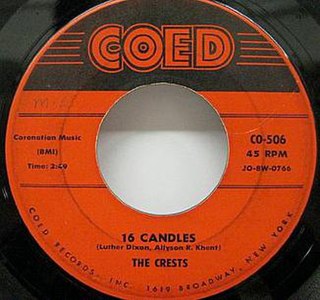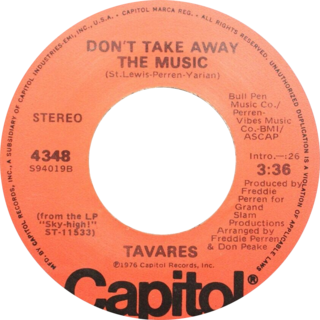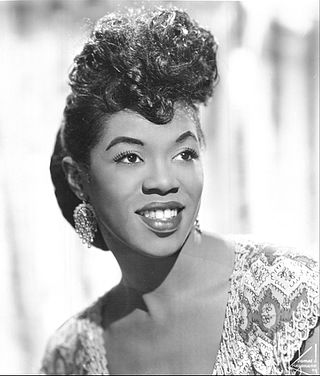
"Chain Gang" is a song by American singer-songwriter Sam Cooke, released as a single on July 26, 1960.
"I Only Have Eyes for You" is a song by composer Harry Warren and lyricist Al Dubin. The song was written for the 1934 film Dames, in which it was performed by Dick Powell. Several other successful recordings of the song were made in 1934, and it later became a hit for the Flamingos in 1959 and Art Garfunkel in 1975.
"Don't Knock My Love" is a hit song performed by R&B singer Wilson Pickett and written by Pickett with Brad Shapiro. Released in the spring of 1971 from the album of the same title, it spent a week at number-one on the Billboard Best Selling Soul Singles Chart and peaked at #13 on the Billboard Hot 100 Singles Chart. The song, which was produced under a funk tempo was Pickett's last number-one single and one of his last hits for Atlantic Records.
"(Now and Then There's) A Fool Such as I" is a popular song written by Bill Trader and published in 1952. Recorded as a single by Hank Snow it peaked at number four on the US country charts early in 1953.

"Take Your Time (Do It Right)" is the debut single by American R&B group the S.O.S. Band. It was released as the lead single from their debut studio album, S.O.S. (1980) on March 18, 1980 through Tabu Records, three months before the album's release.

"Love Ballad" is a song by R&B/Funk band L.T.D. Jeffrey Osborne is the lead singer.
"Get Off" is a song by American disco band Foxy, released in 1978. The background vocals were performed by Wildflower. Released from their LP of the same name, the song became a crossover hit. It spent two weeks at number one on the Billboard Hot Soul Singles chart during the fall of that year and also peaked at number nine on the Billboard Hot 100 singles chart. Along with the track, "Tena's Song", "Get Off" peaked at number 18 on the disco chart.

"16 Candles" is a 1958 song performed by the Crests and written by Luther Dixon and Allyson R. Khent.
"Walking on Sunshine" is a song by Eddy Grant, and the title track of his third studio album. It was released as a single in 1979. Grant's original version was not a hit, but the song was remade three years later by Rockers Revenge, a studio project assembled by producer Arthur Baker, which became the hit version.
"Doggin' Around" is a 1960 Rhythm and blues song written by Lena Agree and originally performed by Jackie Wilson. Reaching both the R&B and the pop singles charts in the U.S., "Doggin' Around" hit number one on the Hot R&B Sides chart for three weeks and peaked at number fifteen on the Billboard Hot 100. The A-side of the single was "Night", based on the aria "My Heart at Thy Sweet Voice" from the opera Samson and Delilah, by Saint-Saëns; it made the top five on the R&B and pop charts.

"I Wonder" is a 1944 song written and originally performed by Pvt. Cecil Gant. The original version was released on the Bronze label, before Gant re-recorded it for the Gilt-Edge label in Los Angeles. The record made it to number one on the Juke Box Race Records chart and was Pvt. Gant's most successful release. In February 1945, pianist, Roosevelt Sykes hit number one with his version of the song. Sykes' version is notable in that it replaced Gant's version, at number one on the Juke Box Race Records chart.
"Funny How Time Slips Away" is a song written by Willie Nelson and first recorded by country singer Billy Walker. Walker's version was issued as a single by Columbia Records in June 1961 and peaked at number 23 on the Hot C&W Sides chart. The song has been featured in several live action films and television shows, such as in the first episode of the second season of AMC’s Better Call Saul and in the 2020 Netflix drama The Devil All the Time.
"Empty Arms" is a song composed and first recorded by Ivory Joe Hunter which became an R&B hit in 1957. This original version peaked at #2 on the US, R&B Airplay chart and at #43 on the pop chart.
"I Love You Because" is a song written and recorded by country music singer-songwriter Leon Payne in 1949. The song has been covered by several artists throughout the years, including hit cover versions by Al Martino in 1963 and Jim Reeves in 1964.
"I'm Coming Home" is the title track from the 1973 album by Johnny Mathis. The song was written by Thom Bell and Linda Creed.

"(Till) I Kissed You" is a song written by Don Everly and recorded by the Everly Brothers. It was released as a single in 1959 and peaked at No. 4 on the Billboard Hot 100. Chet Atkins played guitar on this record and Jerry Allison played drums.
"Devil or Angel" is a song written by Blanche Carter and originally recorded by the Clovers in 1955, where it went to number four on the US R&B Best Sellers chart. It was re-recorded by John Bailey after he left the Clovers and formed another Clovers group for Lana Records in 1965.

"Don't Take Away the Music" is a hit song by R&B/disco group Tavares, released in the fall of 1976. It peaked at number 34 on the US Billboard Hot 100 singles chart and at number four in the UK. Along with the track "Heaven Must Be Missing an Angel", the song spent two weeks at number 1 on the Hot Dance Club Play chart.

"Don't Throw It All Away" is a song written by British musician Gary Benson and first released by the Shadows on their 1975 album Specs Appeal. Benson released his version as a single later the same year, which reached number 20 on the UK Singles Chart in the fall of 1975.

The singles discography of American Jazz artist Sarah Vaughan contains 89 singles, two promotional singles and seven other charted songs. Vaughan recorded her first singles in 1946, with her first release being "If You Could See Me Now". Soon after, she saw her first major chart success on the Billboard pop list with "Tenderly" and "It's Magic." Moving to Columbia Records, she had further pop hits in the late 1940s with covers of "Black Coffee" and "Nature Boy." She had her second top ten hit in 1950 with "(I Love the Girl) I Love the Guy." Vaughan moved to Mercury Records during the 1950s and recorded more pop music. At Mercury, she had her biggest chart success, with the top ten hits "Make Yourself Comfortable" and "Whatever Lola Wants." In 1959, Vaughan's single "Broken Hearted Melody" reached number seven on the Billboard pop chart and became an international success, becoming the biggest single of her career.








